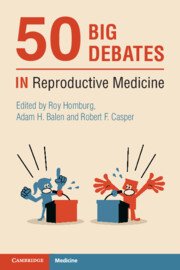Book contents
- 50 Big Debates in Reproductive Medicine
- Series page
- 50 Big Debates in Reproductive Medicine
- Copyright page
- Contents
- Contributors
- Foreword
- Introduction
- Section I Limits for IVF
- Section II IVF Add-ons
- 5A DHEA Is an Effective Treatment for Poor Responders
- 5B DHEA Is an Effective Treatment for Poor Responders
- 6A The Addition of LH/hCG to FSH Improves IVF Outcome
- 6B The Addition of LH/hCG to FSH Improves IVF Outcome
- 7A Acupuncture Is a Useful Adjuvant for Fertility Treatment
- 7B Acupuncture Is a Useful Adjuvant for Fertility Treatment
- 8A There Is a Role for Pre-conceptional Treatment with CoQ10
- 8B There Is a Role for Pre-conceptional Treatment with CoQ10
- 9A There Is a Role for Pre-conceptional Treatment with Vitamin D
- 9B There Is a Role for Pre-conception Treatment with Vitamin D
- 10A Natural Killer Cell Assay in the Blood Is a Useless Investigation
- 10B Natural Killer Cell Assay in the Blood Is a Useless Investigation
- 11A Intralipid Therapy Has a Place in Infertility Treatment
- 11B Intralipid Therapy Has a Place in Infertility Treatment
- 12A The Endometrial Scratch Has Had Its Day
- 12B The Endometrial Scratch Has Had Its Day
- 13A Corticosteroid Therapy Is Useful in Assisting Implantation
- 13B Corticosteroid Therapy Is Useful in Assisting Implantation
- Section III The Best Policy
- Section IV Embryology
- Section V Ethics and Statistics
- Section VI Male-factor Infertility
- Section VII Genetics
- Section VIII Ovarian Stimulation
- Section IX Hormones and the Environment
- Index
- References
8B - There Is a Role for Pre-conceptional Treatment with CoQ10
Against
from Section II - IVF Add-ons
Published online by Cambridge University Press: 25 November 2021
- 50 Big Debates in Reproductive Medicine
- Series page
- 50 Big Debates in Reproductive Medicine
- Copyright page
- Contents
- Contributors
- Foreword
- Introduction
- Section I Limits for IVF
- Section II IVF Add-ons
- 5A DHEA Is an Effective Treatment for Poor Responders
- 5B DHEA Is an Effective Treatment for Poor Responders
- 6A The Addition of LH/hCG to FSH Improves IVF Outcome
- 6B The Addition of LH/hCG to FSH Improves IVF Outcome
- 7A Acupuncture Is a Useful Adjuvant for Fertility Treatment
- 7B Acupuncture Is a Useful Adjuvant for Fertility Treatment
- 8A There Is a Role for Pre-conceptional Treatment with CoQ10
- 8B There Is a Role for Pre-conceptional Treatment with CoQ10
- 9A There Is a Role for Pre-conceptional Treatment with Vitamin D
- 9B There Is a Role for Pre-conception Treatment with Vitamin D
- 10A Natural Killer Cell Assay in the Blood Is a Useless Investigation
- 10B Natural Killer Cell Assay in the Blood Is a Useless Investigation
- 11A Intralipid Therapy Has a Place in Infertility Treatment
- 11B Intralipid Therapy Has a Place in Infertility Treatment
- 12A The Endometrial Scratch Has Had Its Day
- 12B The Endometrial Scratch Has Had Its Day
- 13A Corticosteroid Therapy Is Useful in Assisting Implantation
- 13B Corticosteroid Therapy Is Useful in Assisting Implantation
- Section III The Best Policy
- Section IV Embryology
- Section V Ethics and Statistics
- Section VI Male-factor Infertility
- Section VII Genetics
- Section VIII Ovarian Stimulation
- Section IX Hormones and the Environment
- Index
- References
Summary
Co-enzyme Q10 (CoQ10), transported in the blood by lipoproteins, is an essential component of the inner mitochondrial membrane and is responsible for electron transport in the mitochondrial respiratory chain for oxidative phosphorylation to generate the energy substrate adenosine triphosphate (ATP), and acts as an anti-oxidant within the oocyte. Observational studies suggest that the follicular fluid concentration of CoQ10 diminishes with age (1), and low CoQ10 antioxidant status may indeed correlate with oocyte aneuploidy (2). Consequently it would appear there is a sound rationale for the use of CoQ10 during infertility treatment, perhaps for women with perceived ‘poor oocyte quality’. Furthermore the scientific rationale is supported by several animal studies which demonstrate a beneficial effect of CoQ10 supplementation on embryonic development. However, before all clinicians are encouraged to prescribe Coq10 as the eternal elixir of reproductive youth, evidence for a benefit of supplementation in the IVF clinical setting is required.
- Type
- Chapter
- Information
- 50 Big Debates in Reproductive Medicine , pp. 44 - 45Publisher: Cambridge University PressPrint publication year: 2021



